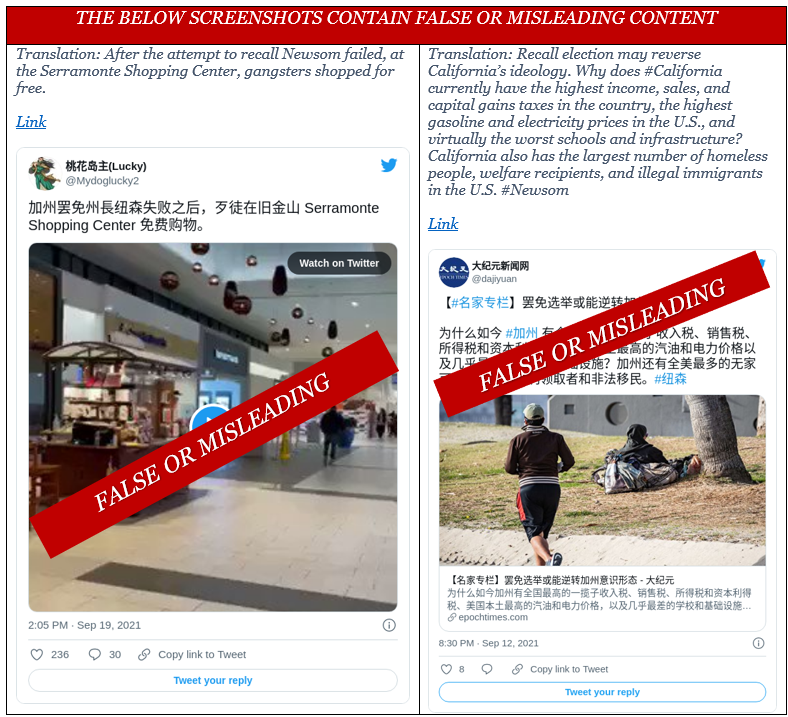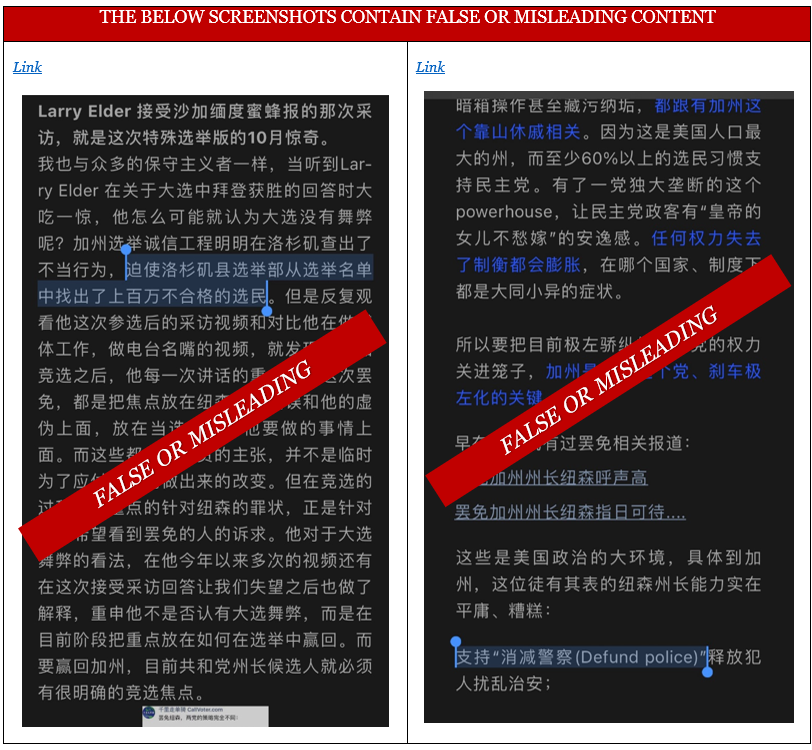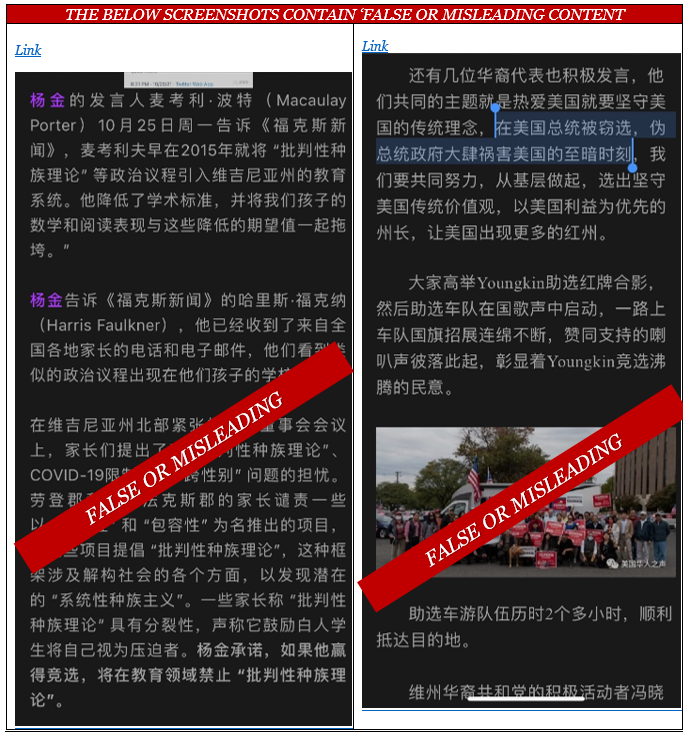

Fake News and the Growing Power of Asian American Voters: What this Means for 20...
source link: https://medium.com/advancing-justice-aajc/fake-news-and-the-growing-power-of-asian-american-voters-what-this-means-for-2022-midterm-6f039bf479a
Go to the source link to view the article. You can view the picture content, updated content and better typesetting reading experience. If the link is broken, please click the button below to view the snapshot at that time.

Fake News and the Growing Power of Asian American Voters: What this Means for 2022 Midterm Elections
When people think of those angrily taking to social media after being misguided by false claims of election fraud, they likely do not immediately think of middle-aged Chinese American Twitter users.
As the political influence of Asian Americans increases, bad actors have worked to build sprawling misinformation networks, including a vast media empire bankrolled by Steve Bannon and Guo Wengui, targeting members of the Asian American diaspora. Falsehoods spread range from harmful health misinformation to lies about the 2020 presidential election. Through translations of false claims and original content creation, these well-resourced groups have made mis/disinfo “accessible” to in-language communities, carefully exploiting home country biases and sensitive topics such as the Chinese Cultural Revolution to cater their messaging to vulnerable diaspora communities.
These efforts, sadly, have been effective. A growing subset of the Asian American community — largely first-generation immigrants for whom English is not their native tongue — subscribe to “the big lie,” question the integrity of electoral processes in the United States, and believe their children are being “indoctrinated” by “critical race theory” in public schools. The success of this misinformation helped propel politicians to victory in elections, including in the 2021 Virginia governor’s race, and if left unchecked, this infodemic has dangerous implications for the 2022 midterms. Chinese-language content on Twitter, YouTube, and WeChat leading up to and immediately after the 2021 California recall election and the 2021 Virginia governor’s race was rife with false claims and misleading information.
To combat the spread of mis/disinformation within our communities, Advancing Justice — AAJC has been tracking messaging trends on social media to gain a better understanding of how bad actors will likely amplify their disinformation campaigns leading up to the November midterms this fall.
Several tweets, many with hundreds of likes or retweets, were direct translations of false claims from individuals like former president Donald Trump and Sidney Powell or news organizations like Newsmax; these tweets (see example below) often linked to original English-language videos or posts that perpetuate false claims, such as referencing the presidential election scam or baselessly asserting mail-in ballot fraud. Other tweets pulled translated quotes from English-language videos, including the following tweet that made false and unsubstantiated assertations about the California recall election even when there was no evidence of fraud.

In Virginia, tweets the day before and the day of the election sought to sow distrust in the election results before polls even closed. The following tweet made false accusations about Democrats “stealing” the election. Others stated that the Republican candidate should win and any other election outcome would indicate fraud, disregarding the fact democratic electoral systems give each candidate a fair shot.

Additional tweets both leading up to and after the recall election in California attempted to falsely attribute various perceived ills of California, such as homelessness and crime, to one candidate. Not surprisingly, several popular tweets surrounding the recall originated from in-language media outlets known for promoting fake news and baseless conspiracy narratives.

YouTube
Another common feature in disinformation targeting Chinese Americans and immigrants is showcasing anti-CCP, anti-communism narratives that incite fear among our communities. Similarly, the video below posted at the beginning of September included various pieces of misinformation concerning existing California laws, including a false assertion about Proposition 47 despite facts stating the law does not end prosecution of thefts under $950 in the state, and misrepresentations of the effects of affirmative action. The video also made incorrect claims about perpetrators of anti-Asian violence. Though some high-profile videos have attempted to paint a different picture, most anti-Asian attacks are perpetrated by white people whose hate is driven by white supremacy and racism.

In Virginia, education-focused topics, especially surrounding critical race theory (CRT), dominated election-related misinformation narratives on YouTube, reflecting the broader campaign on the right to misinform the public about the true nature of CRT. In the video below, a Chinese American volunteer for a political candidate was interviewed to speak about how opposition to CRT, which the individual incorrectly stated “caused discrimination,” helped galvanize Chinese American support for the candidate. In the months leading up to the election, the following video of a Chinese American mother of a Loudon County public school student falsely conflated CRT with the Chinese Cultural Revolution.

WeChat articles available to the public also showed extensive mis/disinfo narratives. The WeChat article below detailed reasons for supporting the Republican candidate and promoted disinformation including “irregularities” and “fraud” in the 2020 election relating to unfounded claims. Similar to mis/disinformation trends on Twitter and YouTube, several WeChat articles contained various misrepresentation of the current governor’s policies and statistics regarding crime and economic growth in California. These articles repeatedly made false assertions and perpetuated lies that seek to incite fear and anxiety among first generation immigrant communities and fuel division between communities of color, who have been working in solidarity to dismantle racism and white supremacy throughout our nation’s history.

Virginia saw similar misrepresentations of its former governor’s policies and beliefs. Some WeChat articles made baseless claims that he introduced “CRT” into Virginia schools as early as 2015 and lowered academic standards, when the truth is critical race theory is not a part of the K-12 curriculum in the state. Others continued to perpetuate conspiracy theories and false assertations on the integrity of our electoral system, further galvanizing voters.

Chinese-language mis/disinfo related to the recall and the Virginia governor’s race appeared to be largely recycled mis/disinfo narratives from certain English-language channels, with additional emphasis on areas especially important to a Chinese American audience, such as crime, education, and anti-Asian hate. These mis/disinfo stories played on the Chinese American and immigrant community’s fears that California and Virginia would “turn into China” and heightened anxiety around perceived threats of socialism and communism.
The above sample articles represent only a smattering of the vast and far-reaching Chinese-language misinformation universe. As the 2022 midterm elections approach, these falsehoods will undoubtedly proliferate. Notably, with the Supreme Court’s recent decision to hear challenges to affirmative action at Harvard and the University of North Carolina Chapel Hill, misinformation about race-conscious admissions policies will likely increase ahead of the court’s ruling on the case, especially given the historical pattern of disinformation targeting Chinese Americans on this issue specifically.
The Asian American community, particularly first-generation immigrants who are English-language learners, are among the most vulnerable to false narratives often due to limited language access to available resources and information. Many rely on community-translated content for important information such as voting and the election process, leaving room for bad actors to inject falsehoods. If left unchecked, the rise of mis/disinformation will have harmful impacts on our communities and undermine the integrity of our elections and democracy.
Combatting Mis/Disinformation in the Asian American Community
Broadly, misinformation has become an increasingly popular subject. And yet, mainstream media sources rarely cover how this issue uniquely affects members of the Asian American diaspora who face rampant mis/disinformation on sites such as WeChat, WhatsApp, and YouTube on an ongoing basis. While politicians have devoted increased resources to reach out to communities of color, including funds to combat mis/disinformation in these communities, additional efforts need to be invested in understanding the underlying causes rather than the symptoms of this issue. Moreover, tech companies that struggle to moderate content in English acknowledge additional blind spots when it comes to addressing non-English mis/disinformation.
Tech companies, social media platforms, and politicians alike need to take more concrete actions to protect Asian American communities from mis/disinformation in their native languages; content in different languages cannot continue to be treated as a “foreign” problem. Steps such as hiring more content moderators with appropriate language and cultural competency, banning the use of discriminatory algorithms, and creating greater platform transparency could make a large difference in shielding communities from harmful mis/disinfo narratives that pose tangible threats to our democracy.
Advancing Justice — AAJC’s mis- and disinformation work focuses on studying and discussing how mis- and disinformation targeted at Asian American communities is distinct from the mainstream mis- and disinformation problem. This effort is part of the Telecommunications and Technology team, which seeks to help our diverse Asian American communities reap the benefits of technology while also protecting them from its potential harms.
Recommend
About Joyk
Aggregate valuable and interesting links.
Joyk means Joy of geeK